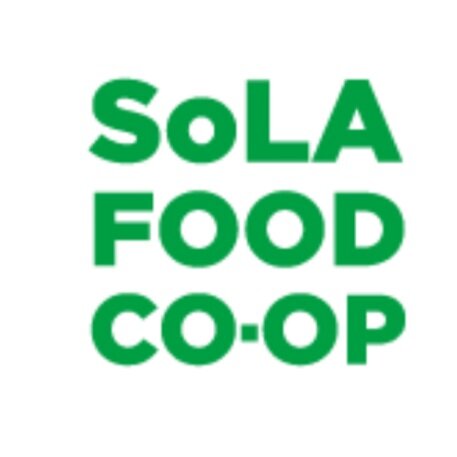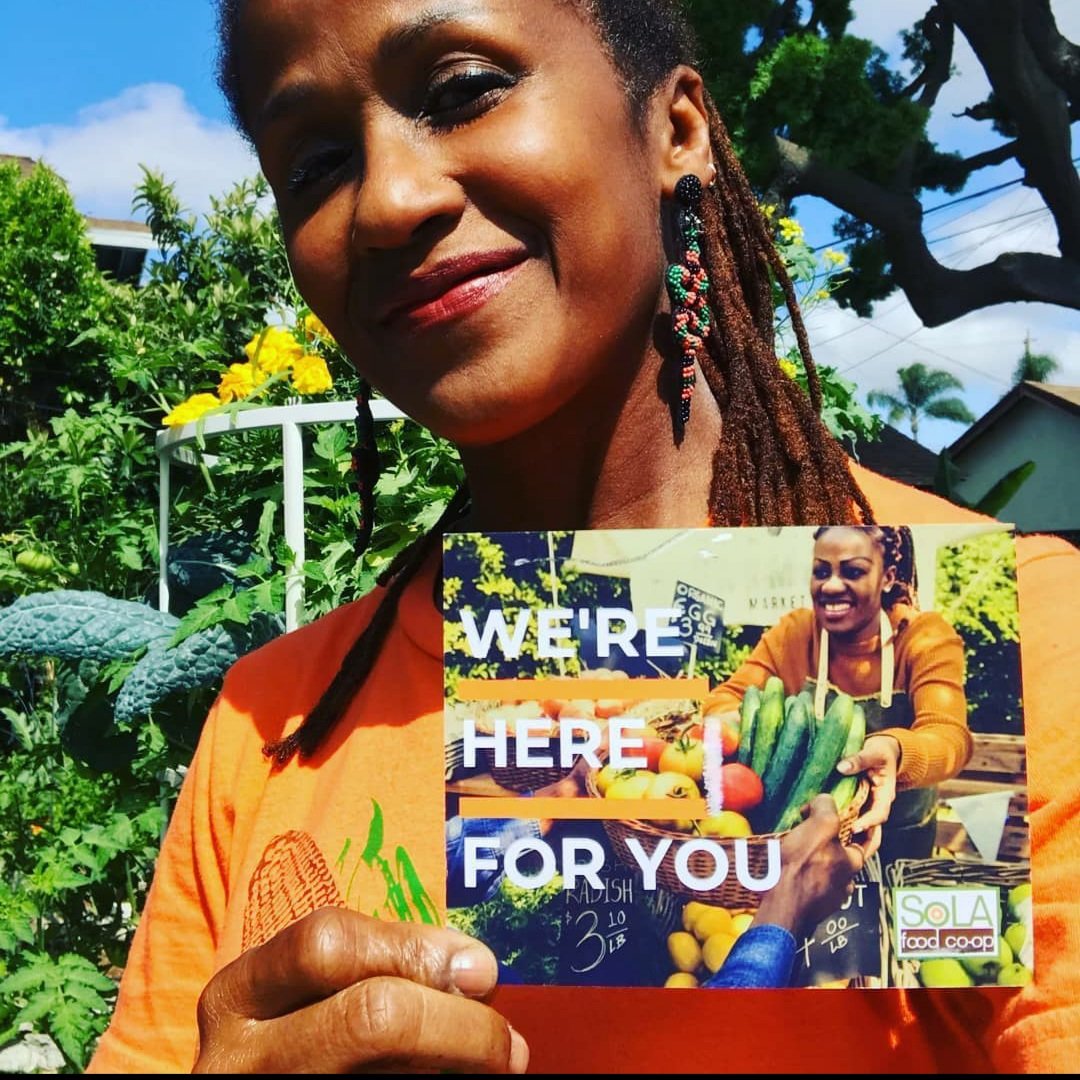From Our Founder
The SoLA Food Co-op Story Where we started, where we're headed, and where we are now.
The Backstory: Starting a food co-op is no small feat.
In 2010 I moved to South LA from Hollywood where I had lived for 16 years, enjoying the vast variety available in food shopping. From Ralph's to Vons, to Pavillions to Erewhon to Lassens , Trader Joes and Sprouts, all were within reach. When I moved to my new home on 43rd St I realized I needed to go back to my old neighborhood for groceries if I wanted to keep eating organic foods. The Ralphs on Crenshaw and Obama and the Ralphs on MLK and Western were both close by, but carried little in organics, because, according to one manager, "people in this neighborhood can't afford them". That seemed unfair. My cousin was then press secretary for the County Supervisor. She said that the supervisor had tried. He had reached out to Trader Joe's and Whole Foods, yet those stores were confident that my community would travel to them. They didn't feel the need to actually enter our neighborhood to serve us. My cousin said , 'Why don't you open a store?" I'm an actress, I narrate audiobooks, and I have been a yoga teacher, but a grocer? That had never crossed my mind! I had no desire to run a grocery store. Then a little voice in my head said: " What if the community owned the store?"
When I googled how to start a co-op, a manual came up! I fell down a rabbit hole of cooperative development resources! I learned there was an organization called California Center For Cooperative Development and that they had a yearly conference. I went. It was April of 2011 in Berkeley CA. They gave me a name tag that said "Untitled South LA Co-op" and I proceeded to have my mind blown. Dana Harvey, Founder of Mandela Marketplace in Oakland was the keynote speaker, and the featured Co-op was La Montañita of New Mexico. I got so inspired to bring a cooperative grocery store to my community, I came home and got the ball rolling.
I mentioned that I'm an actress, this was a real departure for me . I had never before in my life been an organizer or an activist. That said, I was also more than a little naive. The manual I found online seemed to say a food co-op could be organized in 2 or 3 years! As I began, by making a list of people I knew in the area who might want this type of store, and shouting out at various public gatherings, "who wants to help start a co-op?", key players fell into place so that I knew I was headed in the right direction.
SoLA owes many thanks to the people who came through in the very beginning; Milo Clow set up SoLA online, website, twitter, facebook, mailchimp etc. Mustafa Sankofa was our graphic designer and designed our logos, flyers and posters and our t-shirts, Mariealise DiMarco was an early advocate, introduced us to LA Food Policy Council and Community Health Councils, and when she became manager of our local farmers market invited us to have an information table there. Then a young woman popped up at a gathering at Lotus On the Nile and offered to do an early feasibility study for SoLA AS HER THESIS! (thats a $10,000 value folks, for FREE)thank you Moya Ojarigi! So early on things fell into place and I was encouraged.
We were advised by one of the co-op development agencies, Food Co-op Initiative, not to incorporate immediately because you then incur taxes when you have no income. So instead we endeavored to raise awareness and desire for the co-op prior to incorporating. We tabled at events, the Farmer's market, we hosted several events including two big food and music festivals at Fais Do Do in 2012 and 2013. Finally, we incorporated in 2014 and began selling the shares or "memberships". The food co-op development timeline we're following works in stages and what stage your co-op is in is determined by the number of members (owners), you have. SoLA is in the sticky stage 2(a). I say sticky because A LOT has to happen in this stage and it has taken quite some time. This is the stage of feasibility, and this stage begins at around 500 owners. When we reached 500 in 2019, we hired a well known analyst who has worked with many start up co-ops to conduct a formal market study. The market study was deemed favorable. We were moving forward slowly but steadily, We had also been tabling at the Farmers market twice monthly selling organic bulk grains and beans since 2017 and that and our twice yearly member drives, and canvassing events organized by our outreach and engagement assistant were keeping us in the public eye, meeting new folks and growing.
Then the pandemic hit. During the first year SoLA grew. The demonstrations in Los Angeles and other cities caused an uptick in membership. Then in 2021, we experienced some setbacks. Our Board President stepped down from the role of President, (but remains on the Board). Our one paid staff member resigned to take a full time position, and four board members left the board. To date, the office of President is still being held by our "interim" President, one of our founding Board members. We did welcome four new Directors in 2022.
When the Farmer's market closed in the beginning of the pandemic, SoLA pivoted to a contact free pop-up twice monthly for our owners. We offered produce bag subscriptions and pre-packed grains and beans along with locally roasted coffee and freshly pressed juices.
At the end of 2021 we decided to pause food sales since we no longer had our assistant to run that program and we needed to focus on the nuts and bolts of pro forma creation, business plan tune up and site selection. During this period of limited contact we did see a slow down of our accomplishments and member growth. With a volunteer Board of 12 individuals we are at this time working to prepare for our capital raise while at the same time looking for and vetting site options. The needs of a grocery store are specific, our site must have enough parking, and a loading dock, to name two.
The Vision:
To open a full service, community owned grocery store specializing in, but not limited to, natural and organic foods. We plan for our store to include a teaching kitchen, for classes, gathering and community events. We want our store to include a hot and cold bar and grab and go options.
Membership means ownership. When you invest $200 you and your household become owners of the co-op and you have one voting share. Your vote elects the Board of Directors. As an Owner you also become eligible to serve on the Board of Directors.The Board will hire and oversee the General Manager, who will be in charge of operations at the store. SoLA Owners will not be required to work at our store. Our ideal is to locate SoLA Food Co-op along or near the Crenshaw Corridor , South of Jefferson and North of Slauson.
What's taking so long? When will SoLA finally be open?
At this time SoLA is 659 households strong. And that is in alignment with where we are on our timeline. As we move into stage 2(b) we intend to have 700 owners or more. Our goal is to have a strong customer base of at least 1,000 owners when we open doors on our brick and mortar store.
SoLA seeks to locate on or near the Crenshaw corridor.
In a neighborhood that hasn't had a cooperative store before, member sales have been slower and as I mentioned member growth is essential to our success. This was the reasoning for our April 2023 event at Co-Opportunity Market, to give SoLA members and interested parties a chance to see the type of store we envision being, in action.
Currently SoLA's board is working on tightening up all of our systems, in order to be prepared for the capital raise. We are actively seeking operational funding to help with the work. Our 2019 market study and the pro forma we have been working with tell us that our store will cost between 4 and 7 million dollars.
Thank you to all of our Owners, friends, and followers for your continued patience and support while we build SoLA. Just remember, we're a cooperative, everyone is welcome, it's all about working together, pooling resources, forging connections. I encourage you to get involved, lend a hand, share your knowledge.
SoLA Food Co-op is coming!
peace and carrots,
Bahni Turpin




